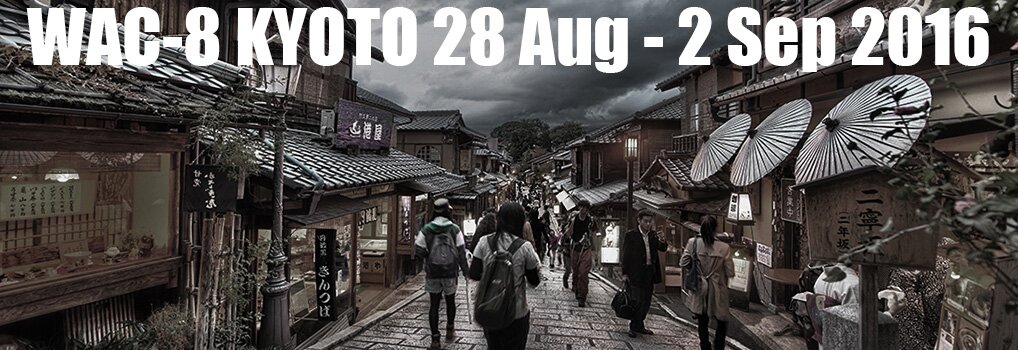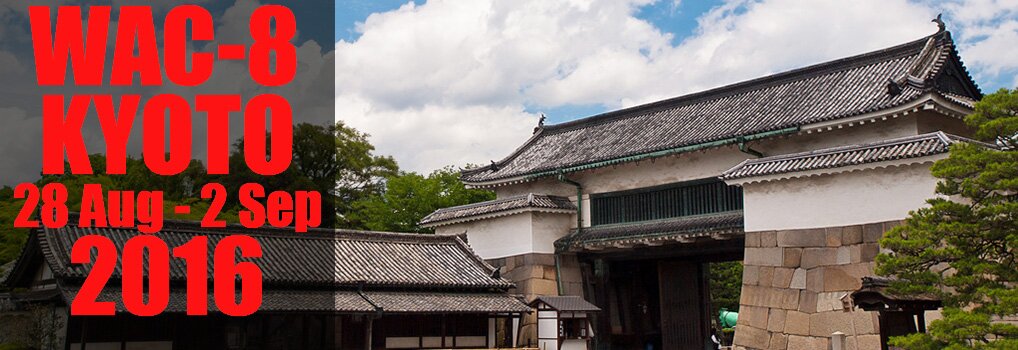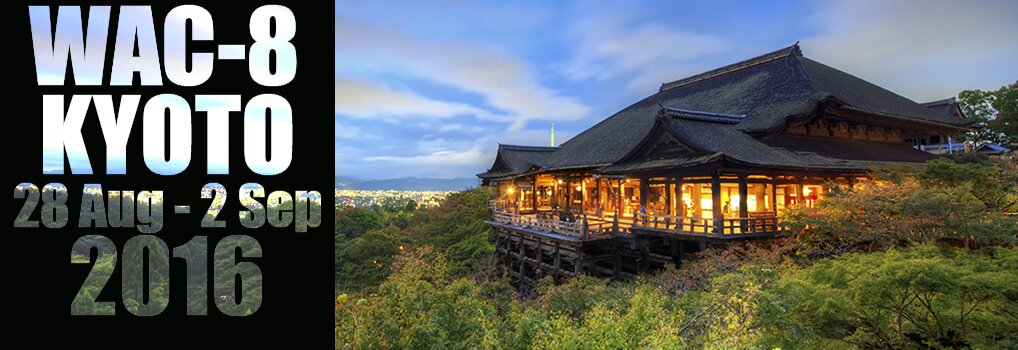| T01 | T02 | T03 | T04 | T05 | T06 | T07 | T08 | T09 | T10 | T11 | T12 | T13 | T14 | T15 |
| Theme list | Session organizers index | Accepted sessions list |
| T01. Archaeology and Development Peter G. Gould |
|---|
| Development—economic growth and the political and social changes associated with it—has become deeply enmeshed with archaeology. Archaeologists are underwriting community development projects, contending with industrial or infrastructure developers, making their livings employed as commercial archaeologists, and working with communities seeking either to benefit from development or to protect traditions from the impact of development. National and international protocols intended to protect and promote heritage and archaeology are encountering obstacles from diverse and sometimes unanticipated directions rooted in development imperatives. Not surprisingly, the discipline is at odds concerning these trends. Archaeologists are at once repelled by the threat posed by development to traditional cultures and the archaeological record; dependent increasingly on tourism, resource extraction or infrastructure development to fund archaeological exploration and conservation; and balancing the anthropologist’s or archaeologist’s desire to preserve material and intangible culture with local communities’ desire for the material and intangible fruits of development. This theme is intended to explore the intersection of archaeology and development in all of its manifestations. We start with the view that it is time for archaeologists to move beyond mere description of the difficulties associated with development. What is needed is in-depth analysis of the contending social, political, and economic forces involved in development, and exploration of the policies and practices best suited to manage those forces. Sessions organized under this theme should seek to make progress in the search for ethical clarity and practical impact as archaeologists engage with development issues. Session organizers should seek to assemble presenters who collectively can address focused themes from complimentary perspectives. |
Archaeological Heritage Management, Sustainable Development and Tourism promotion: Issues and Debates
Organiser(s): V. Selvakumar (Tamil University / India), Jahan Shahnaj Husne (University of Liberal Arts Bangladesh / Bangladesh), Yo Negishi (Akita International University / Japan) and Kaushik Gangopadhyay (University of Calcutta / India)
Type: Symposium
Contact: selvakumarodi(at)gmail.com
Abstract:
Archaeological heritage is a potential source of development that can benefit the local community. Archaeological heritage can be more effectively managed through the promotion of carefully designed, sustainable tourism initiatives, although there is “resentment” among a few sections to the idea of “tourism.” Archaeological monuments and museums would not have any relevance, if they do not get regular visitors. Therefore, visitors are important for their sustainability. In the developing world, due to the demand from dense population, raising the resources required for the management of archaeological heritage has been a difficult task. Although it is argued that archaeological resources can bring development, it cannot be achieved easily without careful planning and execution.
Relevant archaeological Heritage Management Strategies need to be adopted to suit the local cultural contexts. There are several questions in this context. How can we develop viable and truly beneficial develop oriented projects? What are the lessons to be learned from successful projects? What are the impact of the tourism promotion on the archaeological monuments and local communities? This session seeks to focus on the important issues related to archaeological heritage management, sustainable development and tourism promotion, from a global perspective.
Keywords: Archaeological heritage Management, Sustainable Tourism, Archaeology and Development
Mining, Resource, Development and Indigenous Cultural Heritage: The Good, The Bad and The Ugly
Organiser(s): Keiichi Omoto (University of Tokyo / Japan), Junko Habu (University of California, Berkeley / USA) and Claire Smith (Flinders University / Australia)
Type: Symposium
Contact: kocolias(at)msg.biglobe.ne.jp
Abstract:
This session will consider the impacts of mining and other resource development on Indigenous heritage sites and cultural landscapes. Resource development include pipelines, electric power plants, nuclear waste processing facility, solar power stations, and/or geothermal fuel power stations. We seek presentations on both recent examples and the long-term impacts. In some parts of the world, infrastructure was put in over 100 years ago, at a time when there was little or no protection for Indigenous heritage sites. What are the long-term impacts of these developments, both actual and potential, especially in terms of the impacts on tribal subsistence economies?
We seek examples of the good, where mining and/or resource development is supported by the Indigenous community and the impacts of mining are mitigated appropriately. We ask presenters to identify the principles and key actions that have produced positive outcomes. We seek examples of the bad, where mining and/or resource companies and Indigenous people have been in conflict. We ask presenters to consider how this conflict might have been avoided. We seek examples of the ugly – those events that should never arise again. We hope to identify principles that support better outcomes for Indigenous communities.
Keywords: resource development, mining, Indigenous, cultural heritage
Publics, Communities, Archaeologists and Development
Organiser(s): Peter Gould (University of Pennsylvania Museum of Archaeology and Anthropology / USA) and Tim Schadla-Hall (University College London / UK)
Type: Symposium
Contact: pgould8(at)gmail.com
Abstract:
This session explores the intersection of archaeology and development as it is manifested in archaeologists’ work with public entities and local communities impacted by development. Through historical analysis or studies of contemporary cases, papers should explore the contending social, political, and economic forces involved in development and discuss and evaluate official policies or archaeological practices best suited to manage those forces. These may include various forms of public archaeology or community archaeology projects, engagement with public policy or private industry, or other points of intersection between the practice of archaeology, the activities of archaeologists, and the imperatives of economic and social development. The session seeks to further the search for ethical clarity and practical impact for archaeologists, whether as protagonists or as observers of the interaction of archaeology and the development process.
Keywords: public archaeology, community archaeology, economic development
Commercial Archaeology in Emerging Economies: Lessons from Developed Economies
Organiser(s): Caleb Adebayo Folorunso (University of Ibadan / Nigeria), Ian Lilley (The University of Queensland / Australia), Charles Lesquene (Environmental Resources Management (ERM), Oxford / UK)
Type: Forums
Contact: cafolorunso(at)gmail.com
Abstract:
Commercial Archaeology has been practiced in the developed economies particularly United States of America and Western Europe for some time while its practice in the emerging economies particularly in Africa is insignificant. Consideration for archaeological resources in the course of the planning of developmental projects is generally very poor in the regions of emerging economies for obvious reasons which include the absence of heritage resources management policies, weak legislations for the protection of heritage resources, lack of positive public perception of the value of heritage resources and the over bearing harsh economic situation that renders consideration for heritage to be of no importance. The World Bank Environmental Assessment policy which takes into consideration impact on physical cultural resources in development projects it finances is a window of opportunity for poor nations and nations of emerging economies to safeguard their physical cultural heritage. The proposed session attempts to bring together commercial and non-commercial archaeologists from different socio-economic backgrounds to evaluate and discuss the process, problems, achievement and prospects of commercial archaeology in their regions of operation, thereby learning and sharing from experiences of others.
Keywords: development projects, commercial archaeology, emerging economies
Development on Indigenous Lands
Organiser(s): Kylie Lower (Flinders University / Australia), Jordan Ralph (Flinders University / Australia) and Quentin Agius (Ngadjuri Nation / Australia)
Type: Symposium
Contact: kylie.lower(at)flinders.edu.au
Abstract:
This session explores initiatives employed by Indigenous communities in navigating the protection of their archaeological and intangible heritage in development contexts. While there are a number of factors that remain out of the control of Indigenous groups when it comes to development in ongoing colonial systems, this session seeks to bring together diverse groups of people to discuss strategies employed to protect heritage in development contexts. We invite Indigenous community representatives, or archaeologists working in conjunction with those communities, to present on their experiences and discuss the strategies they have initiated to effectively negotiate heritage protection in development-initiated projects.
This session discusses the following issues:
• What are the main issues faced by Indigenous groups working to protect heritage?
• How have Indigenous groups undertaken strategies assisting in gaining more control over the development process?
• What initiatives Indigenous groups have undertaken with developers to both facilitate development and assist in the protection of heritage?
• What are the main challenges faced by various Indigenous groups around the world and how are they managing those challenges?
• What ethical issues have archaeologists working within this area encountered and how have they navigated them?
• What policy changes could most assist Indigenous groups in their respective contexts?
Keywords: Development and Indigenous Heritage; Ethics and Development; Indigenous Heritage Management
Examining the Social and Economic Impacts of Archaeological Field Schools
Organiser(s): Brent Lane (University of North Carolina / USA), Ivan Vasilev ( Balkan Heritage Foundation / Bulgaria) and Ran Boytner (Institute for Field Research / USA)
Type: Symposium
Contact: brent_lane(at)unc.edu
Abstract:
The economic value of archaeological research is usually perceived as a content provider for tourism activities. But over the past decade researchers have recognized and described host community economic spillover effects from the performance of archaeological research itself. Panelists will present recent papers that identify and describe the mechanisms through which field schools generate socioeconomic effects and quantify those impacts on local communities. The panel will then discuss best practices for amplifying the positive impacts of field schools for the benefit of both stakeholder communities and archaeological researchers.
Keywords: economic development; field schools; heritage economics
Archaeology and Sustainable Development – What’s Worked; What Hasn’t; What Data?
Organiser(s): Paul Burtenshaw (Sustainable Preservation Initiative / USA) and K.H.J. Boom (Leiden University / Netherlands)
Type: Forums
Contact: paulb(at)sustainablepreservation.org
Abstract:
The past decade has seen increased attempts by archaeologists to enact local sustainable development in communities around archaeological sites as well as demonstrate to funders, governments and stakeholders the importance of archaeology as an economic and social asset. These attempts are hampered by a lack of information and shared experience on what has worked, and more importantly what has not, on previous projects. This forum presents the experiences and data of organizations who have conducted projects across the globe. What can we collectively learn from our efforts so far on how to do such projects? What data do we need to collect to better inform ourselves and stakeholders, produce better projects and advocate for archaeology as a development asset? The forum will include presentations by the Sustainable Preservation Initiative and other organizations active in the field, with the issues discussed and analyzed with a distinguished panel and with an open debate with attendees.
Keywords: sustainable development, community archaeology, public archaeology data
Benefiting From Development: A Challenge for Archaeologist
Organiser(s): Arlene K. Fleming (The World Bank / USA) and Elsa Chang ( / Guatemala)
Type: Forums
Contact: arlenekfleming(at)gmail.com
Abstract:
International and commercial investment banks offer significant opportunities for vastly expanding the archaeological record world-wide. Since the mid 1980s, when The World Bank issued its Operational Policy Note for the management of cultural property, other international and regional banks, as well as bilateral aid agencies, have stipulated that cultural heritage, including archaeology, be covered in environmental and social impact assessments (ESIA) required for development projects. The cost of investigations in ESIAs is borne by the development proponents. Moreover, most countries include cultural heritage in their national legislation and requirements for such assessments. However, the potential benefits are far from realized in many countries, in large part due to a lack of knowledge, interest and participation by archaeologists in the development process. There tends to be little communication and collaboration between authorities responsible for cultural heritage, ESIA and development. Archaeologists are rarely pro-active during the planning and preparation phases of projects, and even less so, when Strategic Environmental Assessments (SEA) are undertaken for broad range long-term planning. In cases when archaeological material is discovered during development project preparation or implementation, the information and material often is not made available to cultural heritage authorities and professional archaeologists, nor utilized systematically to augment the archaeological record, creating instead, scattered, hidden ‘grey literature.’
The session includes invited speakers who will summarize the potential benefits for archaeology offered by development project requirements, and the current shortcomings, followed by a discussion considering possible corrective measures.
Keywords: Development projects, Environmental and Social Impact Assessment, ‘grey literature’
Archaeology and sustainable heritage management under pressure in developed economies: from mitigation to valorisation
Organiser(s): Yoshio Negita (Agency of Cultural Affairs / Japan), Jean-Paul Demoule (University of Paris / France) and Laurent Nespoulous (INALCO / France)
Type: Symposium
Contact: laurent.nespoulous(at)gmail.com
Abstract:
Archaeological heritage management in the developed world consists of a mitigation process, often conducted under time pressure in the face of commercial development, and efforts to preserve, valorise and utilize specific sites.
In Japan, for example, mitigation (preservation by record, preventive excavations, etc.) is conducted as a public service applying the same standards across the country in order to compensate for the loss to development of archaeological heritage seen as public property. The need to valorise these properties arose as a justification for a public service often perceived as a hindrance to development. As a result, heritage managers face the need to innovate creatively to communicate the value of the accumulated archaeological assets. Furthermore, new organisational and personnel requirements to achieve sustainable heritage management have recently gained prominence in the country in the aftermath of the Great East Japan Earthquake.
Conditions driving change in heritage management practices, rescue/preventive archaeology, and the valorisation of heritage differ among countries. Increasingly, however, there are major concerns even in developed countries where resources to support traditional government-based heritage management are under pressure. This session aims to connect available experience from other developed countries in order to move toward a global approach to sustainable archaeological heritage management in the face of development imperatives and declining government resources. The session will focus on experiences from around the world, with particular emphasis on new methods to manage the processes of mitigation and valorisation, in order to achieve more sustainable public support and heritage preservation. We seek also to clarify who should decide which heritage to preserve, who should conduct the work, who should pay for it, and who should benefit from the resulting heritage resources.
Keywords: Archaeological heritage management, sustainable, mitigation, valorisation




